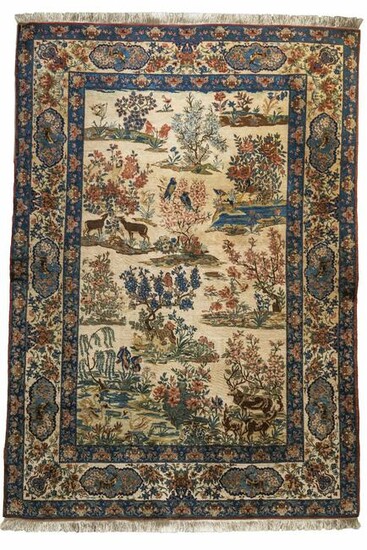Antique Isfahan Emami 217 X 157 Cm
Origin : Central Persia
Size: 217 X 157 cm (Approximately 85.4 X 61.8 inch)
Age: 1st quarter of 20th century
Knots: 10 x 10 = 100 knots per sq cm
Condition: Excellent. Collectable item.
Weaver�s name: Emami.
Description of Design and History:
Antique Isfahan Rugs (or Esfahans Rugs), claim a very proud tradition among Persian rugs going back to Safavid times in the seventeenth century. Isfahan was then the capital of Persia and many of the court quality carpets of this period that survive today have been attributed to Isfahan. Their designs consist of sublimely delicate patterns of arabesque tendrils, palmettes, and cloud-bands in rich magentas, blues, and saffron golds. 19th century and early twentieth century antique oriental rugs from Isfahan continued the style and consummate technical virtuosity of their classical forerunners, although often with a softer, more decorative palette.
After Isfahan�s success in the garment industry, they expanded their knack for producing fine textiles by weaving some of the greatest rugs ever made in Persia. The city has long been a breeding ground for master weavers. The most famous of these is Sadegh Seirafian who spawned an Isfahan rug weaving dynasty that continues today. Antique Isfahan rugs feature enrapturing designs and luxurious materials that were also used to manufacture garments. Many of the finer carpets from the workshops of master weavers used silk wefts. However, the city�s earliest Isfahan rugs used fine hand-spun cotton.
The weavers and artists in Isfahan gathered inspiration from Persia�s best achievements. They borrowed dramatic spiraling vine-scrolls with deeply re-curved tendrils from the city�s famous buildings. They also featured archetypal Persian designs that were inspired by the art and architecture of Shah Abbas, who ruled the Safavid Empire at its height. Antique Persian rugs from Isfahan incorporate flamboyant architectural medallions and unparalleled arabesques, but the city has another side too. Isfahan rugs and illustrate scenes from Persia�s outstanding literary works. The rugs of Isfahan are exceptionally attractive, captivating and classically Persian. These traits have made antique Isfahan rugs sought after by designers and collectors seeking Persia�s most iconic and archetypal rugs.All natural dyes are paramount for the carpet to have more than just decorative value. Beyond that, various dyers had varying levels of skill and invested different lengths of time in dyeing the yarns. The �quality of color��its radiance and level of nuance within each color�is centrally important. Certain rare colors such as Tyrian purple, saffron yellow, cochineal rose and greens add to the carpet�s value.
View it on
Estimate
Time, Location
Auction House
Origin : Central Persia
Size: 217 X 157 cm (Approximately 85.4 X 61.8 inch)
Age: 1st quarter of 20th century
Knots: 10 x 10 = 100 knots per sq cm
Condition: Excellent. Collectable item.
Weaver�s name: Emami.
Description of Design and History:
Antique Isfahan Rugs (or Esfahans Rugs), claim a very proud tradition among Persian rugs going back to Safavid times in the seventeenth century. Isfahan was then the capital of Persia and many of the court quality carpets of this period that survive today have been attributed to Isfahan. Their designs consist of sublimely delicate patterns of arabesque tendrils, palmettes, and cloud-bands in rich magentas, blues, and saffron golds. 19th century and early twentieth century antique oriental rugs from Isfahan continued the style and consummate technical virtuosity of their classical forerunners, although often with a softer, more decorative palette.
After Isfahan�s success in the garment industry, they expanded their knack for producing fine textiles by weaving some of the greatest rugs ever made in Persia. The city has long been a breeding ground for master weavers. The most famous of these is Sadegh Seirafian who spawned an Isfahan rug weaving dynasty that continues today. Antique Isfahan rugs feature enrapturing designs and luxurious materials that were also used to manufacture garments. Many of the finer carpets from the workshops of master weavers used silk wefts. However, the city�s earliest Isfahan rugs used fine hand-spun cotton.
The weavers and artists in Isfahan gathered inspiration from Persia�s best achievements. They borrowed dramatic spiraling vine-scrolls with deeply re-curved tendrils from the city�s famous buildings. They also featured archetypal Persian designs that were inspired by the art and architecture of Shah Abbas, who ruled the Safavid Empire at its height. Antique Persian rugs from Isfahan incorporate flamboyant architectural medallions and unparalleled arabesques, but the city has another side too. Isfahan rugs and illustrate scenes from Persia�s outstanding literary works. The rugs of Isfahan are exceptionally attractive, captivating and classically Persian. These traits have made antique Isfahan rugs sought after by designers and collectors seeking Persia�s most iconic and archetypal rugs.All natural dyes are paramount for the carpet to have more than just decorative value. Beyond that, various dyers had varying levels of skill and invested different lengths of time in dyeing the yarns. The �quality of color��its radiance and level of nuance within each color�is centrally important. Certain rare colors such as Tyrian purple, saffron yellow, cochineal rose and greens add to the carpet�s value.



